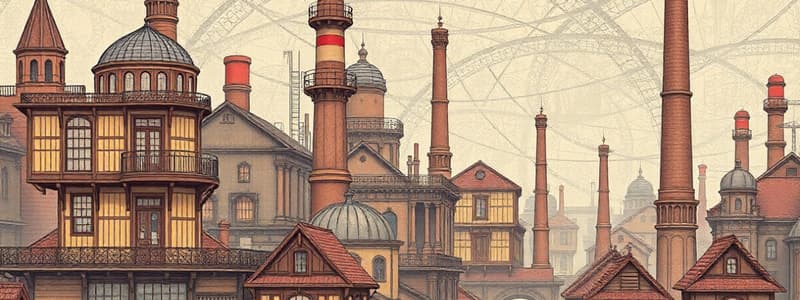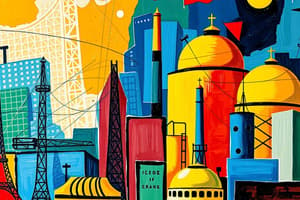Podcast
Questions and Answers
What does the term 'industry' refer to?
What does the term 'industry' refer to?
All economic activities of companies, people, and organizations engaged in producing goods and services within a specific field.
Which of the following is NOT a type of industry?
Which of the following is NOT a type of industry?
- Agriculture
- Manufacturing
- Entertainment (correct)
- Automotive
Match the types of economic classification with their descriptions:
Match the types of economic classification with their descriptions:
Primary Industry = Involves extraction and production of raw materials Secondary Industry = Focuses on manufacturing and construction Tertiary Industry = Provides services rather than goods Quaternary Industry = Involves information technology, research, and development
What is the focus of raw-material based classification?
What is the focus of raw-material based classification?
What type of industries focus on significant capital investment and advanced technology?
What type of industries focus on significant capital investment and advanced technology?
Public Sector industries are owned and operated by individuals or groups.
Public Sector industries are owned and operated by individuals or groups.
Which type of industry operates within a country’s borders?
Which type of industry operates within a country’s borders?
What is the definition of an operating system in an organization?
What is the definition of an operating system in an organization?
What key element integrates all parts of a system to accomplish an overall goal?
What key element integrates all parts of a system to accomplish an overall goal?
Flashcards are hidden until you start studying
Study Notes
Industry Overview
- Industry encompasses all economic activities of entities engaged in producing goods and services in a specific field.
Types of Industry
- Agriculture
- Automotive
- Aviation
- Construction
- Energy
- Food and Beverage
- Manufacturing
- Mining
- Telecommunications
- Aerospace
- Textile and Apparel
- Education
Economic Classification of Industry
- Primary Industry: Involves extraction and production of raw materials.
- Secondary Industry: Focuses on manufacturing and construction of goods.
- Tertiary Industry: Provides services rather than physical goods.
- Quaternary Industry: Involves information technology, research, and development.
Classification of Industry
-
Raw-Material Based Classification: Based on type of raw materials.
- Agro-Based Industries
- Mineral-Based Industries
- Marine-Based Industries
- Forest-Based Industries
-
Size Classification: Based on scale of operations.
- Small-Scale Industries: Limited capital and technology, labor-intensive.
- Large-Scale Industries: Significant capital investment and advanced technology.
-
Ownership Classification: Based on ownership structure.
- Private Sector: Owned by individuals/groups.
- Public Sector: Owned by the government.
- Joint Sector: Operated by both state and private entities.
- Cooperative Sector: Managed by suppliers, producers, or workers.
-
Heavy vs. Light Industries: Based on capital intensity.
- Heavy Industries: Substantial capital investment and large-scale production.
- Light Industries: Lower capital requirements, often labor-intensive.
-
Domestic vs. Foreign Industries: Based on operational location.
- Domestic Industries: Operate within national borders.
- Foreign Industries: Operate within the country but originate outside.
-
Durable vs. Non-Durable Goods: Based on product longevity.
- Durable Goods: Long-lasting products.
- Non-Durable Goods: Short lifespan or immediate consumption products.
-
Manufacturing vs. Construction: Based on type of production.
- Manufacturing: Produces final consumption goods.
- Construction: Produces intermediate goods/services for other sectors.
Industry Evolution
- Industry 1.0 - Mechanization: Involvement of steam engines led to mechanized manufacturing, especially in textiles, marking the transition from manual to machine production.
- Industry 2.0 - Mass Production: Introduction of electricity and assembly lines; Henry Ford pioneered mass production techniques, leading to product standardization and economies of scale.
- Industry 3.0 - Automation: Rise of electronics and IT systems automating production processes; increased efficiency through robotics and global supply chains; lean manufacturing and Just-In-Time (JIT) systems emerged.
- Industry 4.0 - Digital Transformation: Integration of cyber-physical systems, big data, IoT, and AI; real-time data usage for decision-making and mass customization through smart factories.
Operating Systems in Organizations
-
Operating System Definition:
- Defined by Everett E. Adam & Ronald J. Ebert as the part of an organization that produces physical goods/services.
- Defined by Ray Wild as a configuration of resources combined to provide goods or services.
-
System Definition: An organized collection of integrated parts designed to achieve an overall goal.
Key Elements of a System
- Components (Parts): Individual elements that comprise the system.
Studying That Suits You
Use AI to generate personalized quizzes and flashcards to suit your learning preferences.




